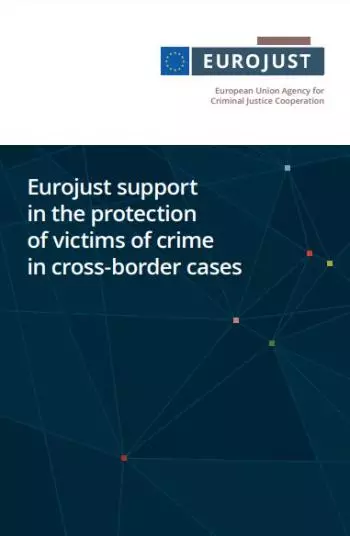An estimated 15% of EU citizens (about 75 million people) fall victim to crime every year. Eurojust supports numerous cross-border criminal investigations each year, helping to deliver justice to thousands of victims of all forms of serious crime. The complexity of cross-border cases makes it especially difficult for judicial authorities to protect victims’ rights. Involving Eurojust early in the process helps to overcome these difficulties and ensure victims’ protection.
Eurojust’s role
Ensuring victims’ rights is an issue that pervades the vast majority of Eurojust’s casework. The Agency minimises the risks associated with the cross-border dimension of cases by ensuring timely and efficient coordination between the various countries and actors involved in guaranteeing victims’ rights. Eurojust is uniquely positioned to facilitate information exchange on victims to identify, facilitate their rescue and protect them. Moreover, it is able to help prevent and solve conflicts of jurisdiction and find concrete solutions for victims across the European Union, such as ensuring their right to compensation.
Eurojust’s expertise
Eurojust set up its Victims’ Rights Working Group to bring together the Agency’s expertise in this field. The Group consists of representatives from all Eurojust crime-based Working Groups and is responsible for compiling, monitoring and analysing victim-related issues reported by practitioners working on Eurojust-referred cases. Through its targeted guidelines for practitioners, Eurojust advises on the most effective ways to protect victims’ rights. Based on Eurojust’s operational work and using case illustrations, the Report on Eurojust’s casework on victims’ rights captures the Agency’s broad experience and offers an overview of best practices to overcome victim-related challenges in various EU priority crime areas. The first ever Symposium on victims’ rights was organised on 24-25 April 2024. The event brought together practitioners and representatives from national and EU bodies to exchange best practices and discuss the challenges associated with the cross-border nature of cases.
Working in partnership
The Agency supports Member States and EU institutions including the European Commission Coordinator for victims’ rights to ensure that the victims’ rights dimension within the context of judicial cooperation is reflected in EU legislation, such as the Directive on Victims’ Rights. Eurojust is also a member of the EU Victims’ Rights Platform consisting of representatives of European Justice and Home Affairs agencies, networks, bodies and civil society organisations working on implementing the EU Strategy on Victims’ Rights.

